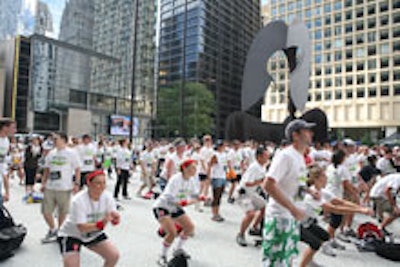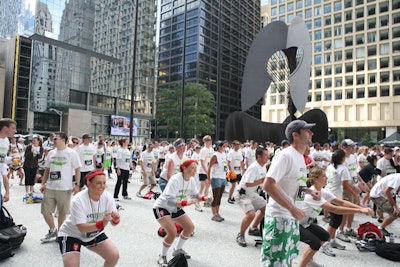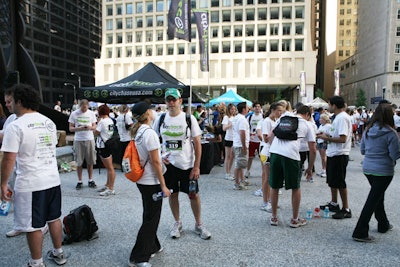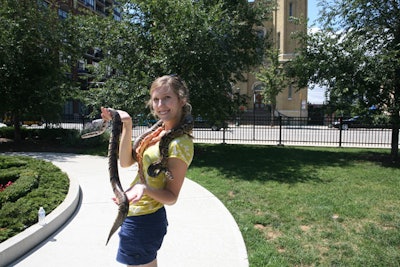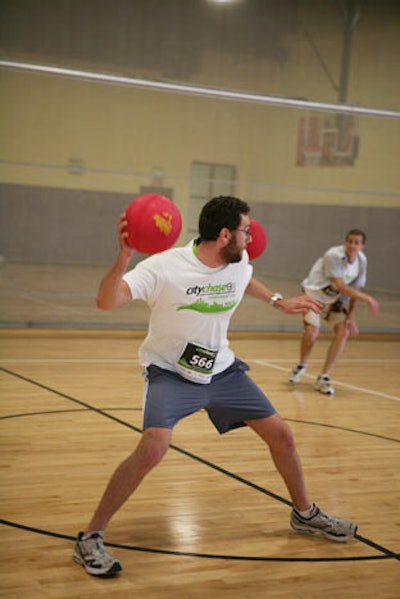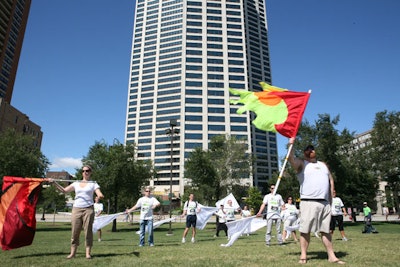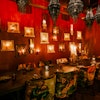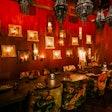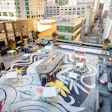Billed as an "urban adventure," City Chase is a daylong event that allows teams of two to compete in activities at various venues—dubbed "ChasePoints"— that are spread out across a city. Now in its sixth year, the race-slash-scavenger-hunt took place in Philadelphia in May, then traveled to San Diego in June and New York in July before wrapping up in Chicago last Saturday; the series culminates at the North American championships in Quebec City next week.
According to Marcia Callaghan, national event coordinator for the games' U.S. series, Chicago saw more than double the crowds of the other markets, drawing roughly 1,400 participants. "Chicago is where we're headquartered, and both Jason Erkes [president of City Chase] and I have relationships here that we can leverage," Callaghan said. "We can pull off some crazy things here that we just couldn't in other cities, and that really makes the Chicago event stand out." In cities where the event is less well-known, such as Philadelphia, "I'm straight-up cold calling venues, saying 'I'm planning an urban adventure. I'd like to rig a trapeze in your venue and have people flying from the ceiling. Is that cool?'"
Though the event's Chicago iteration didn't involve any high-flying stunts, there was no shortage of quirky activities, which spanned from Lincoln Park to Chinatown to Bucktown. Before arriving at Saturday's opening ceremony at Daley Plaza, City Chase participants had little idea what their day would entail; and only found out when organizers distributed clue sheets that detailed the day's 38 ChasePoints.
After "massive brainstorming sessions," Erkes, Callaghan, and the City Chase team drew up an agenda that let teams compete in everything from Japanese haiku writing to a runway walk-off at local boutique Akira; teams also chopped up meat at a West Loop butcher shop. And at a ChasePoint that doubled as a Southwest Airlines promotion for its business class service, teams pulled oversize business suits from branded suitcases, donned the garb, and ran laps on a track.
Because winners only have to complete 10 challenges, then cross a finish line, participants don't all follow the same course throughout the day. "I'd say only about 25 percent of the teams are in it to win it and running it out," Callaghan said. "The people who want to win [a chance to compete in Quebec City] will avoid any bottleneck situations and places with high traffic, but most of the people are interested in doing the really fun, quirky activities. They may run into each other on the train, and people will say, 'I just came from here, you have to go,' or 'You can ride horses here.'"
Callaghan said that one of the greatest challenges in planning the event was letting each venue know how much traffic to expect. Ultimately, she told each location to prepare for 75 percent of participants to pass through, "just to be safe." Callaghan likened planning the event—which has "so many moving parts, it would blow any planner's mind"—to setting up a row of dominoes, and hoping they all fall the right way. Just as participants don't know what to expect before they get their clue sheets, "the way the day unravels is kind of a surprise for us internally," she said. "When you have 1,400 people spread out over all these locations, you just never know if people will decide to go the same route, or how people are going to decide to break down their days."
For almost all participants, who spent anywhere from three to six hours checking out various ChasePoints, the day ended at Joe's Bar, where, Callaghan said, "we had a finish line that let people cross directly into the bar."
